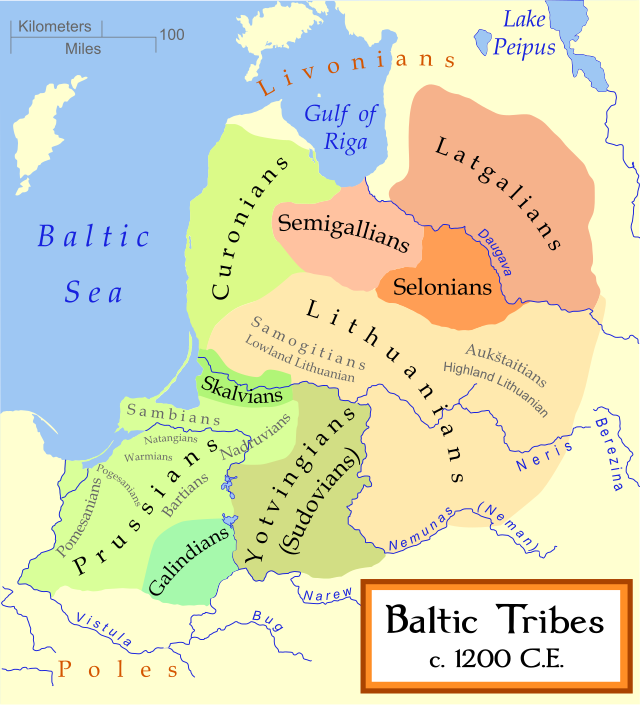Yotvingians
Historical Baltic people From Wikipedia, the free encyclopedia
Yotvingians (also called: Sudovians, Jatvians, or Jatvingians; Yotvingian: Jotvingai; Lithuanian: Jotvingiai, Sūduviai; Latvian: Jātvingi; Polish: Jaćwingowie, Belarusian: Яцвягі, German: Sudauer) were a Western Baltic people who were closely tied to the Old Prussians.[1][2] The linguist Petras Būtėnas asserts that they were closest to the Lithuanians.[3] The Yotvingians contributed to the formation of the Lithuanian state.[4]

Culture
Etymology
According to Vytautas Mažiulis, the name Sūduva derives from a local hydronym *Sūd(a)vā, derived from a Baltic verbal root, *sū-: to flow, pour.[5]
Language
Numerous linguists consider the Yotvingian language as a dialect of the Old Prussian language.[1] The Lithuanian linguist Petras Būtėnas states that such an opinion is incorrect, because the Lithuanian kalnas predominates in Yotvingian toponymy instead of the Old Prussian garbis.[3] The Lithuanian professor Zigmas Zinkevičius wrote that the Yotvingians spoke a dialect of Western Baltic that was closer to Lithuanian than Prussian.[6] The only known written source of the Yotvingian language is the manuscript "Pagan Dialects from Narew".[7]
Geography

The Yotvingians lived in the area of Sudovia (Yotvingia) and Dainava, southwest from the upper Nemunas river. Today, this area corresponds mostly to the Podlaskie Voivodeship in Poland, portions of Lithuania west of the Nemunas and a part of Hrodna Province in Belarus. The territory was between the later cities of Marijampolė and Merkinė (Lithuania), Slonim and Kobryn (Belarus), and Białystok and Lyck in Prussia (now Ełk, Poland).
Before the 10th century, in the south, Yotvingian homesteads reached the Brest area. In the west, they reached the Narew river basin. In the north, they reached the Vilnius' and Kaunas' southern outskirts. The territory was shrinking over time.
- Kurgans of Sudovian culture predate Yotvingian presence
- A kurgan in the area of Suwałki
- A kurgan in the area of Jatwieź Duża
History
Summarize
Perspective
This article needs additional citations for verification. (October 2010) |
Ancient history
According to The Histories of Herodotus (5th century B.C.), the Neuri (Νευροί) were a tribe living beyond the Scythian cultivators, one of the nations along the course of the river Hypanis (Bug river), west of the Borysthenes (Dniepr river).[citation needed] This was roughly the area of modern Belarus and Eastern Poland by the Narew river, coinciding with the Yotvingian linguistic territory of toponyms and hydronyms (Narew river)[8] and the Scythian[9] tribe of the Aroteres to the south-east.[8][10]
Ptolemy in the 2nd century AD called the people Galindai kai Soudinoi (Σουδινοί). Peter of Dusburg called them Galindite and Suduwite.[citation needed] In the Hypatian Codex the spelling changes: Jatviagy, Jatviezie, Jatviažin, zemlia Jatveskaja, na zemliu Jatviažs´kuju and more. Polish sources also used Russian spellings: Jazviagi, Iazvizite, Jazvizite, Yazvizite.[citation needed]
This name was taken by the papal administration: terra Jatwesouie, Gretuesia, Gzestuesie, Getuesia und Getvesia.[citation needed] The Knights called this tribe Sudowite, Sudowia, in qua Sudowit.[8] and the Scythian[9] tribe of the Aroteres to the south-east.[8][10]
10th century
In 944, during the treaty between the Kievan Rus' prince Igor and the emperor of the Byzantine Empire, the Yotvingians were hired by the Kievan ruler to serve as mercenaries.[citation needed] In 983, Vladimir I of Kiev hired the Yotvingians to add to his army.[citation needed]
13th century


In two dotations, in 1253 and 1259, by Mindaugas, a new name was recorded: Dainava, Deynowe, Dainowe, Denowe (land of songs). The forests were named Deinova Jatvež.[citation needed] In the 1260 treaty with the Teutonic Knights, the region is called "terre Getuizintarum".[citation needed][clarification needed] Skalmantas, leader of the Yotvingians was responsible for single-handedly raiding Pinsk in the Principality of Turov.
14th century
In the sentence of Breslau of the emperor Sigismund of Luxembourg to the Livonian Order from 1325, this area is called Suderlandt alias Jetuen.[citation needed]
15th century
Vytautas the Great wrote about "terra Sudorum", in a letter to King Sigismund of March 11, 1420.
A 1860 census by the clergy of the Belarus Grodno area, had 30,929 inhabitants identifying as Yatviags.[11]
Notable Yotvingians
- Komantas of Sudovia led the Yotvingians in the Prussian uprisings.[12]
Wikimedia Commons has media related to Yotvingia.
See also
Literature
- Totoraitis, Jonas (2003) [1938]. Sūduvos Suvalkijos istorija (in Lithuanian). Marijampolė: Piko valanda. ISBN 978-9986-875-87-1.
- Witczak, K. T., Traces of Dual Forms in Old Prussian and Jatvingian in Woljciech Smoczynski and Axel Holvoet, eds, Colloquium Pruthenicum primum, 1992, pp 93–98
- Gerullis, G., Zur Sprache der Sudauer-Jadwinger, in Festschrift A. Bezzenberger, Göttingen 1927
- Toporov,V., ИНДОЕВРОПЕЙСКЕ ЯЗЫКИ [Indo-European languages] Лингвистический энциклопеический словарь.[Linguistic encyclopedic dictionary] Moskva, 1990, pp 186–189
- Mažiulis, V., Baltic languages. Britannica Online Encyclopedia
- Henning, E., De rebus Jazygum sive Jazuin-gorum, Regiomonti, 1812
- Sjoegren, A., Ueber die Wohnsitz Verhaeltnisse und der Jatwaeger, St. Petersburg, 1859
- Sembrzycki, J., Die Nord-und Westgebiete the Jadwinger und deren Grenzen, Altpreussischeme Monatschrift, XXVIII, 1891, pp. 76–89
- W. R. Schmalstieg, Studies in Old Prussian, University Park and London, 1976.
- V. Toporov, Prusskij jazyk: Slovar', A - L, Moskva, 1975–1990.
- V. Mažiulis, Prūsų kalbos etimologijos žodynas, Vilnius, t. I-IV, 1988–1997.
- Archäologie der UDSSR: Die Finno-Ugrier und die Balten im Mittelalter, Teil II, Balten, S. 411–419, Moskau 1987
- Lepa, Gerhard (Hrsg): Die Sudauer, in Tolkemita-Texte Nr. 55, Dieburg 1998
- Lepa, Gerhard: Gedanken über die Prußen und ihre Lieder, in Tolkemita-Texte "25 Lieder der Sudauer" Nr. 56, Dieburg 1999
- Litauische Enzyklopädie, Bd. XXVX, Boston, USA, 1963
- Salemke, Gerhard: Lagepläne der Wallburganlagen von der ehemaligen Provinz Ostpreußen, Gütersloh, 2005, Karten 19/ 7 - 19/ 13
- Žilevičius, Juozas: Grundzüge der kleinlitauischen Volksmusik, in Tolkemita-Texte "25 Lieder der Sudauer" Nr. 56, Dieburg 1999
References
Sources
External links
Wikiwand - on
Seamless Wikipedia browsing. On steroids.



